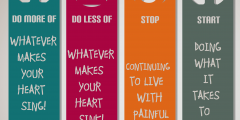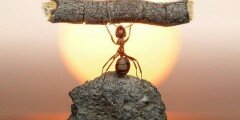
Wisdom is defined in the Oxford Dictionary as “The quality of having experience, knowledge, and good judgement; the quality of being wise“.
How is wisdom measured?
But how is wisdom measured? How do we know who is wise or who isn’t? Isn’t wisdom a subjective judgment made in the light of whether we agree with the person or not? Do the army of ISIL think their leader who is beheading victims in support of their “cause”, believe he is wise? Does the risk-taker who makes good, look like a person of wisdom, or is the cautious person who takes the safe route, and makes good the wise one? Is wisdom about making decisions or achieving good results, or treating people with compassion? Is it about right doing, accurate thinking, or emotional intelligence?
The truth is that not all experience, knowledge or judgment creates wisdom. The ageing process doesn’t automatically mean a gaining of wisdom. In fact there are numerous examples of bright young children who seem to be endowed with wisdom well ahead of their years. Equally there are many older people who seem to never learn. This report on show “People aged 60 and over are now the fastest growing age group in the prison estate. The number of sentenced prisoners aged 60 and over rose by 103% between 2002 and 2011″. Not that I am generalising widely enough to suggest that just because you are in prison, means you aren’t wise, but it does seem to indicate a lack of wisdom somewhere along the way.
Wisdom is a state of mind
I am still not convinced there is a definitive state which describes wisdom accurately. The measurement of wisdom is like beauty, mainly in the eye of the beholder. In my own life and experience, I have accumulated some common criteria, in the shape of certain characteristics which are mostly alive in wise people, which may consciously or unconsciously be seen by others as wisdom. These characteristics can be seen when people of wisdom are:
In touch with their right minded intuition
We have two thought systems which play out our world. These are the “ego” thought system and the “right minded” thought system. The ego believes in attack and judgment, difference, separation, self importance, specialness and usually self-righteous indignation. Everyone has an ego inner voice, which can be mistaken for intuition. Thus suicide bombers, people who kill in the name of a cause and even people who are simply angry most of the time, are simply believing in the disempowering ego voice. An extreme example of “ego” thought intuition is when killers say “God made me do it”. They have an inner god, but it is in reality the ego thought system at play.
In stark contrast “right minded intuition” comes from our higher self. Our higher self deals in unconditional love, forgiveness, win/win, a celebration of our commonality and our recognition that everyone is equally valuable. Our right minded intuition would never hurt anyone and will stand silently by while we listen to our “ego thought system”, which we frequently do. This intuition never judges, helps us take complete responsibility for our lives and helps to guide us to move from ego thinking to our higher self or “right minded” thinking. In my own humble opinion, wise people are in touch with their “right minded intuition”.
The barriers to wisdom
The barriers to gaining “right minded” wisdom are our experiences, our beliefs about our world, our beliefs about who we are, our shadow self (which represents the unconscious guilt, self hate and fear we all have buried): Our quest for specialness and our continuous embedded thought system which we have believed for many many years. Real education is about unlearning those barriers to our “right minds” and the conditions and false beliefs which skew our perspective. Education in this context is not about learning about the world, it is more about “unlearning our conditioning about the world”.
Real education is the getting of wisdom
Being on a journey of self-awareness and “unlearning” is where the real “getting of wisdom” lies. It is the ultimate route to our “real selves”. Our real self and our true nature is where our wisdom lies. Real wisdom, like our real selves is the domain of unconditional love, true joyfulness, peace and natural abundance. It is not something you can learn, it is only about unlearning an incorrect thought system.
Are you on the route to wisdom?




When I was about age 14 my mom pointed out one of my friends, a couple years older, and said Cassie is wise. I didn’t understand her point. I knew Cassie struggled in school. This article brought me back to where I adopted the word wisdom as one of my words to live by. The decision making process, selecting one option over another, choosing good over evil – such as choosing to genuinely celebrate the promotion of a co-worker when in your heart you would like to be recognized too. Wisdom, by my most basic understanding is discernment. Doing the right things for the right reasons with the right motives. As you said, wisdom is neither knowledge nor age related. Wisdom is acted out of values, character, and ethics.
Thanks Jane, lovely words of wisdom from a wise lady! For me, you’ve described the inner choice point where wisdom comes from makimg and acting on decisions from our right minded thinking. There is always a choice, the sadness is many of us don’t know we have one. Thanks so much for reading and commenting.
Excellent comment Jane. Your ‘co-worker’ reference brings in another quality of wisdom which is reasonable humility. Humility can also counter any elements of misplaced ego. A definition of integrity that I really like is that it’s “who you are when no-one is looking” which also fits well in this discussion. Jane also mentioned the input her Mum had in relation to wisdom. This helps demonstrate that wisdom can be transferred and in some small ways taught or shown. In addition, we never really know who is watching us and the unknown effect and impact we might be having on others.
Dave, thank you for adding your wise perspective! You talk about humility and integrity which I agree fit with this discussion so well, and I believe these character traits arise from inner wisdom. Your final point about never knowing who we are teaching is such a fine one. Thanks so much for joining the conversation
Thanks for sharing this Christina, It’s a good reminder to look in the places that we often avoid . . .our shadow self. It is an uncomfortable place to explore and yet the peace of mind and deep inner joy that come from such exploration are extraordinary. Although it is not a prerequisite for wisdom there is a lot to be said for the practice of Mindfulness. A lot of the people we acknowledge as wise have done a lot of work on their levels of self-awareness and often practice some form of mindfulness. It is a great way to access the more uncomfortable ‘ego’ thoughts to see them for what they are and move beyond their reactive nature into a more ‘right minded’ responsiveness. However this takes effort and willingness to admit our failings and vulnerability and to acknowledge that it is just part of being human. Sadly this level of self-awareness is still lacking in many leaders but i am very optimistic that there is now more tolerance in the business community for this kind of conversation. Thanks again for raising it.
Hi David, thanks so much for commenting. Your work on mindfulness is an extremely important part of the “getting of wisdom” and I applaud what you do because it can be uncomfortable for people (leaders) to understand they may be making decisions from an ego thought system and I believe it can often be the “road less travelled”, and not commercially popular, practicing mindfulness can bring this sharply into focus. Like you, though I believe for anyone willing to get out of their comfort zone and practice mindfulness, will definitely reap the rewards, although it is not always an easy path to take. Thanks and wishing you a great week ahead.
I’m reminded of a quotation by Henri Bergson who said, “To exist is to change, to change is to mature, to mature is to go on creating oneself endlessly.”
Using the quote as a foundation, I would say, “To learn is to change, to change is to become wise, to become wiser is to go on gaining wisdom endlessly,”
Existence is a life-long learning process, which leads to wisdom, regardless of the subject one is pondering, researching, reading, or learning.
Increasing one’s wisdom feeds the intrinsic rewards of life.
Thanks for the article. It is very thought provoking.
David, thanks so much for responding, and your kind comments. Your quote is extremely appropriate in this context, thank you. I would add that I believe as you state existence is indeed a life-long learning process, and being consciously aware of this, can circumvent the length of the journey.
Thanks so much and wishing you a very happy Monday!